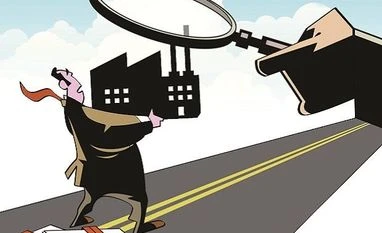There is a pall of fear that more companies may default before things get better. It reminds me of the fence paradox theory. Think of a cliff with a beautiful view of a river running in a valley thousands of feet below. One careful watcher lies on his stomach and peers over the cliff because that is the safest thing to do. Another is braver, or more brash. He stands at the edge to take a selfie, and falls over. There is a hue and cry, forcing the government to put up a fence. Soon many watchers come and lean against the fence to peer down. The rush becomes greater. As the crowd jostles, the fence gives way and many people fall to their deaths. Thus, ironically, the fence put up to make the spot safer results in more deaths.
When applied to investing in fixed-income securities, the paraphernalia of credit bureaus, size and access restrictions, etc is fences put up to protect unwary investors. But as recent incidents show, triple A ratings can turn to default in less than a year. It is equivalent to the fence being certified as safe by an independent agency, but giving way the very next day.
The impact of the fence paradox can be minimised in many ways. One is to provide better and more prominent disclosures. Think of prominent warning signs warning people not to crowd around the fence, or boards disclosing the updated number of fatalities at the spot. Something similar can be attempted in the fixed-income market.
No company turns into a defaulter overnight. The warning signs are there for quite some time. Usually, suppliers and creditors become aware of its difficulties much before anybody else, as it starts delaying payments. Just imagine if any delay (say, of more than three days) has to be reported in the auditor’s report. Today even listed companies do not have to report this to anybody as long as the delay is not to an MSME creditor, and the default is not vis-à-vis a financial creditor. Let us say it is made compulsory for any company that has borrowed money from banks, NBFCs or public deposits to provide details of undisputed dues to its suppliers and creditors that are delayed by more than two-three days in its audit report that is available for public consumption. In these days of GST, when invoice dates are not easily modifiable and electronic payments where date of payment is easily trackable from the bank account, any company that discloses undisputed delays to its suppliers is likely to face an issue in getting access to credit from anywhere. This kind of prominent warning board will not eliminate defaults but can definitely reduce their impact significantly.
The writer is a Sebi-registered investment advisor
To read the full story, Subscribe Now at just Rs 249 a month
Already a subscriber? Log in
Subscribe To BS Premium
₹249
Renews automatically
₹1699₹1999
Opt for auto renewal and save Rs. 300 Renews automatically
₹1999
What you get on BS Premium?
-
Unlock 30+ premium stories daily hand-picked by our editors, across devices on browser and app.
-
Pick your 5 favourite companies, get a daily email with all news updates on them.
Full access to our intuitive epaper - clip, save, share articles from any device; newspaper archives from 2006.
Preferential invites to Business Standard events.
Curated newsletters on markets, personal finance, policy & politics, start-ups, technology, and more.
Need More Information - write to us at assist@bsmail.in
)